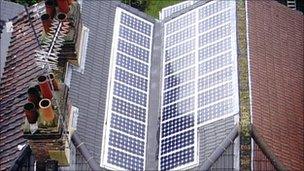First Minister praises Bridgend solar panel scheme
- Published

The project aims to save an estimated 3,000 tonnes of carbon dioxide each year
Free solar panels will be offered to 500 households in Bridgend and the Vale of Glamorgan as part of a community project.
Bridgend-based charity Sustainable Wales launched the scheme to help low-income households deal with fuel poverty and reduce emissions.
First Minister Carwyn Jones praised its "innovative thinking".
But Consumer Focus Wales warned of potential pitfalls, advising consumers to seek legal advice before committing.
The Power of the People project aims save an estimated 3,000 tonnes of carbon dioxide each year.
According to the Energy Saving Trust, installing an average solar electricity system (2.7kWp) costs around £12,000 including VAT.
Solar electricity systems, which can significantly reduce electricity bills, can cost in the region of £4,000 to £5,000 per kWp installed, but costs per kWp should reduce as system size increases.
The panels emit no carbon dioxide, helping to minimise a household's carbon footprint.
In a joint statement made with assembly member Janice Gregory, Mr Jones said: "This scheme puts together so much that is important in the new Wales we are building."
There is also an opportunity to earn money from the UK government's solar incentive schemes, such as selling surplus electricity back to the grid.
Sustainable Wales director Margaret Minhinnick said: "The twin issues of climate change and fuel poverty are crucial to our society. They pose a double threat to our way of life."
Consumer Focus Wales urged consumers to do their research and get legal advice before signing up to free solar panel schemes.
Energy specialist Lindsey Kearton said: "Free solar panels could cut consumers electricity bills and allow them to produce green energy at no cost, but customers need to go into these deals with their eyes open.
"These long-term contracts need to be considered carefully. Asking the right questions and getting legal advice could help customers avoid the potential pitfalls of these schemes," she said.
She advised homeowners to find out who was liable if anything went wrong, what happened if you sold your house to a buyer who did not want to inherit the scheme, and who owned the solar panels after the benefit of the feed-in tariff ran out.
- Published8 July 2011
- Published3 March 2011
- Published27 January 2011
- Published16 November 2010